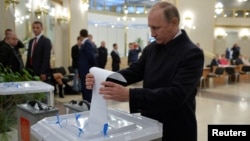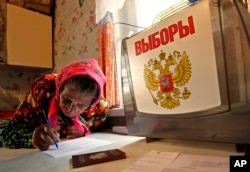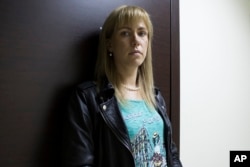Russian President Vladimir Putin's United Russia party pulled off a landslide victory in Sunday's elections for seats in the State Duma, the lower house of Russia's parliament.
Putin's party won 54 percent of the vote with a historically low voter turnout — just 48 percent. The victory gives United Russia an additional 105 seats in the 450-seat Duma. Trailing far behind were the Communist Party of the Russian Federation (KPRF) with 13.35%, the Liberal Democratic Party of Russia (LDPR) with 13.16%, and A Just Russia party (SR) with 6.21%.
While longtime Russia watchers saw little significant in this year's Duma election, it did feature some notable changes compared to the previous one, held in 2011. The biggest change was the decision to move the election's date from December 4 to September 18. That decision forced candidates to do some of their campaigning during the summer, a time when many Russians are on vacation.
The second peculiarity was a controversy over candidates running for office in Crimea. This was the first election since Russia annexed the Black Sea peninsula from Ukraine in March 2014. The election of Crimean deputies to the Russian Duma has not only provoked outrage in Ukraine, but also poses serious questions for foreign governments, the majority of which recognize Crimea as part of Ukraine.
Finally, the election was characterized not only by record low voter turnout, but also the absence of opposition demonstrations in response to the results. By contrast, allegations of rigged voting in the 2011 election brought thousands of Russians onto the streets of Moscow, kicking off a wave of protests that lasted into the following year.
This time, while there have been reports of the usual vote-tampering practices such as ballot stuffing and carousel voting, protests have not materialized.
Mobilizing voters
Russia's "non-systemic" opposition parties — so-called because they operate outside the official political establishment — failed to make the 5 percent threshold required to win seats in the Duma. This time around, however, that opposition was joined by a new face — Maria Baronova, an outspoken activist who narrowly avoided a prison sentence for her part in the opposition demonstration on Moscow's Bolotnaya Square on May 6, 2012.
Baronova ran under the auspices of Open Russia, a project by exiled Russian tycoon Mikhail Khodorkovsky. Rather than focus on winning or losing, Baronova's campaign was directed at mobilizing people to get involved in politics and gain experience in campaigning.
"We managed to get on the ballot — this is already a huge experience," Baronova told VOA.
"This is the first time in the history of the country a person has gathered that quantity of signatures — 15,000 real signatures in the most difficult place to get them. That's 3 percent of the electors [voters] in that district. That's a very big number. Basically, in any case, this is a victory."
Baronova vowed that her political activities would continue whatever the results at the polls.
Apart from its novelties, Sunday's election provided none of the drama or surprises of the December 2011 vote. While United Russia made massive gains, the Duma has long been seen as a rubber-stamp parliament, where initiatives put forth by the president are often passed with no significant opposition, even from nominal opposition parties such as the KPRF and LDPR.
In 2018, however, Russia will have its next presidential election. Although Putin has not yet declared his intention to run for another six-year term, it is widely believed that he will not only run, but win.
If so, Putin's next term will last until 2024, making him one of the longest-serving leaders in Russian history.






